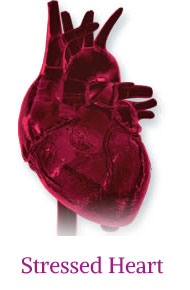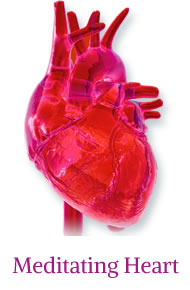Ametlik Transtsendentaalse Meditatsiooni Eesti koduleht
Promoting a healthy heart and life
Research shows that regular practice of Transcendental Meditation reduces physical stress and promotes and maintains a healthy heart


Stress damages the heart
Psychological stress has been shown to increase activation of the sympathetic nervous system and the hypothalamic pituitary adrenal axis. This increased activation releases adrenaline, noradrenaline, and cortisol, which lead to faster heart rate, increased cardiac output, and narrower arteries.
These changes, in turn, create increased blood pressure. Activation of these systems also accelerates the progress of atherosclerosis and can lead to acute plaque rupture, which results in ischemia of the heart (angina) and coronary heart disease and stroke.
TM promotes a healthy heart
The twice-daily practice of the Transcendental Meditation technique reduces activation of the sympathetic nervous system—which, in turn, dilates the blood vessels and reduces stress hormones, such as adrenaline, noradrenaline, and cortisol, and provides stress relief. Published research confirms that TM:
- Reduces high blood pressure
- Reduces atherosclerosis
- Reduces constriction of blood vessels
- Reduces thickening of coronary arteries
- Reduces use of antihypertensive medication
- Reduces mortality rates
Research validates the benefits to health
The National Institutes of Health has granted over $20 million to study the effects of the Transcendental Meditation program on the prevention and treatment of heart disease, hypertension, and stroke. In addition, hundreds of other studies have been conducted on the beneficial effects of the TM program for mind, health, behavior, and society at over 210 independent universities and research institutions in 33 countries, including Harvard, Yale, and UCLA Medical School.
- Reduced High Blood Pressure & Death Rates - American Journal of Cardiology
- Reduced High Blood Pressure & Reduced Hypertensive Medication - American Journal of Hypertension
- Reduced Atherosclerosis - American Journal of Cardiology
- Reduced Thickening of Coronary Arteries - The American Heart Association's Stroke
- Reduced Constriction of Blood Vessels - Psychosomatic Medicine
- Reduced Blood Pressure - International Journal of Neuroscience
- Reduced Myocardial Eschemia - American Journal of Cardiology
- Slowing of Aging - International Journal of Neuroscience
- Stress Relief - Integrative Cancer Therapies
- Reduced Hospitalization Rates -American Journal of Managed Care
- Decreased Medical CareUtilization and Hospitalization - Psychosomatic Medicine
- Increased Creativity - Journal of Creative Behavior
- Improved Memory - Memory and Cognition
- Increased Intelligence - Intelligence
- Decreased Anxiety - Journal of Clinical Psychology
- Reduced Alcohol Abuse - American Journal of Psychiatry
- Increased Productivity - Academy of Management Journal
- Reduced Blood Pressure:Comparisons with Other Procedures - The American Heart Association's Hypertension
